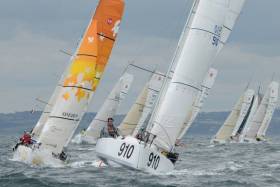Displaying items by tag: Solo Sailer Tom Doran
Lecture - "2016 Offshore Racing in France-A Steep Learning Curve"
#Lecture - "2016 Offshore Racing in France-A Steep Learning Curve" -An illustrated lecture by Solo Offshore Sailor Tom Dolan is to take place on Thursday 16 February at 20:00hrs.
The venue for the Glenua & Friends organised lecture series as usual is at the Poolbeg Yacht & Boat Club, Ringsend, Dublin 4. There will be an entry fee of €5 in aid of the RNLI.
What a year 2016 was for Tom Dolan!
About this time last year on a wet and windy Thursday night in Poolbeg Yacht and Boat Club, he gave a short presentation to Glenua members and friends on his experiences in the Mini Transat 2015. As promised, he is back in Poolbeg after a much more successful season where learning from mistakes was crucial.
Tom spent the winter preparing a new boat from scratch. His first outing with the new machine led him to his first (and Ireland’s first) victory in the class when he won the 500 Mile "Mini en Mai".
A month later another win in the Trophée MAP and he set his sights firmly on the SAS,a singlehanded race from Les Sables d'Olonne to The Azores and back for which he was named favourite. He arrived in Horta in second place but disaster struck in the return leg. He arrived back in France in 11th place!
Tom promises to share, warts and all, this and other learning experiences in his presentation in video and slide formats.
A rapid progression by Tom in the Glenans Irish Sailing School from volunteer to sailing instructor, to sailing centre manager in Ireland and France and passion for the sea, earned him an enviable reputation in the sail training world. However, below the radar, so to speak, was talent and increasing engagement with the challenges of ocean racing.





























































